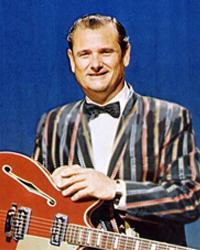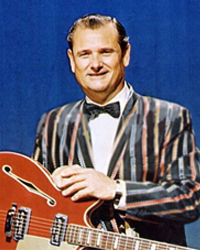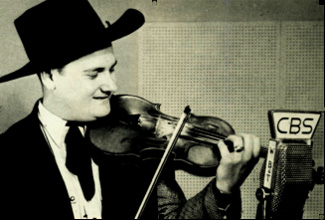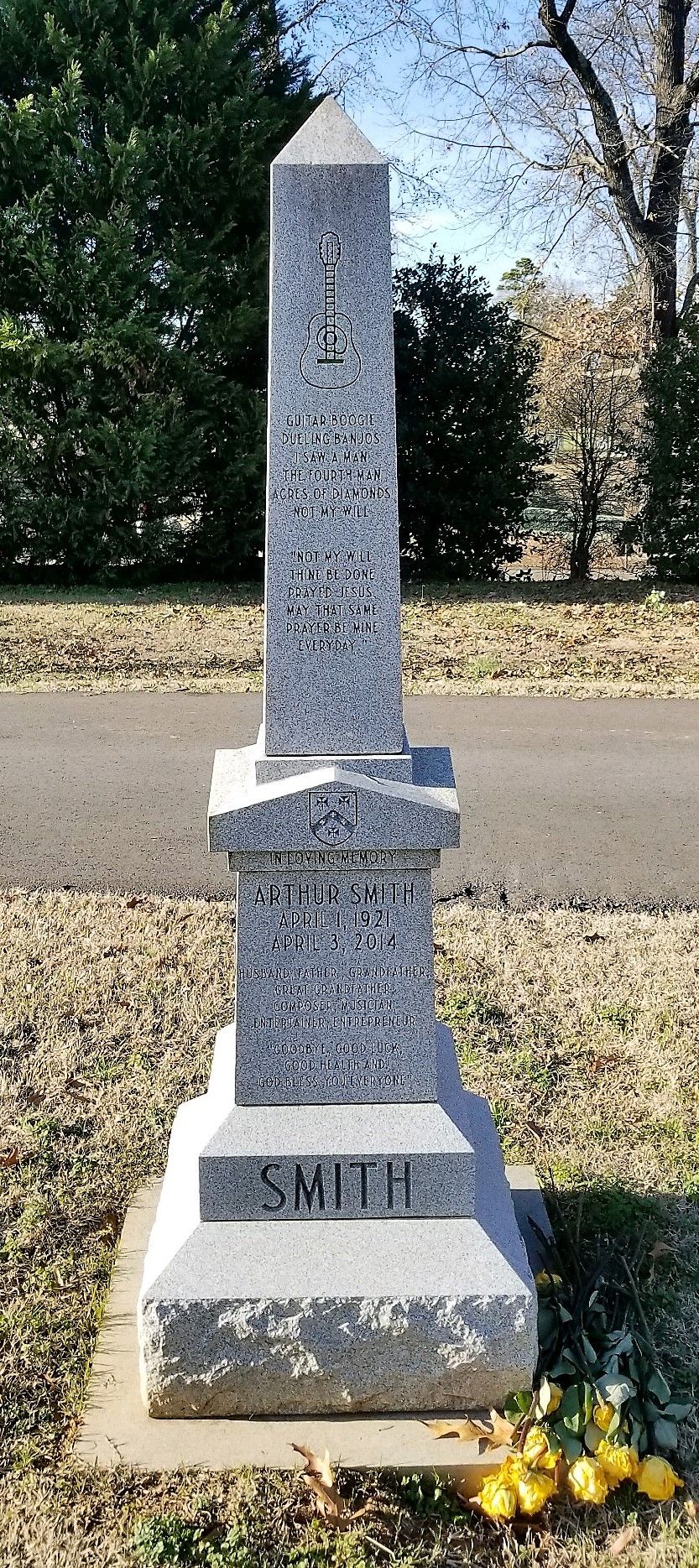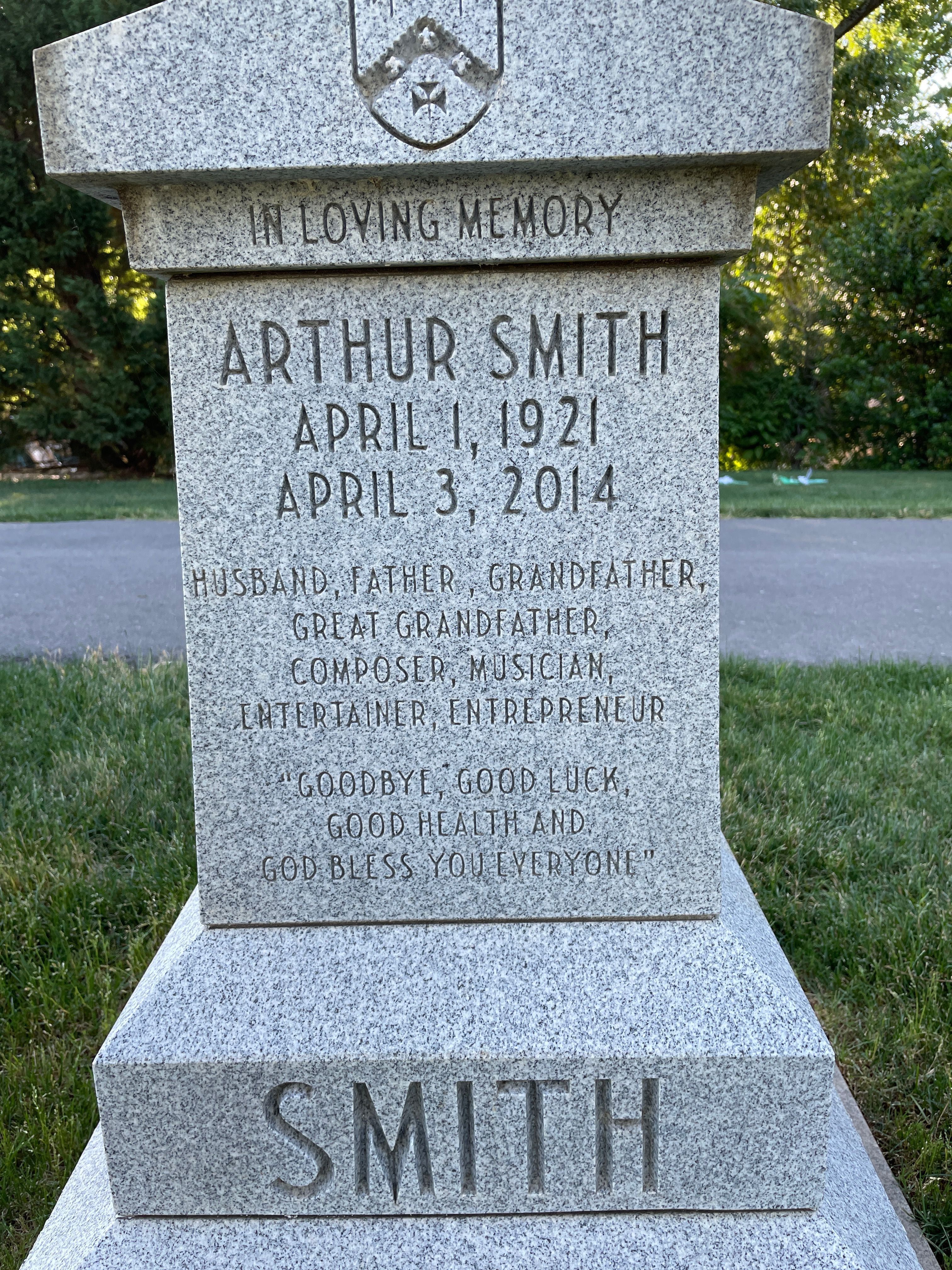Musician. He gained fame as an American musician, playing several instruments, as well as being a composer, and songwriter, who received an Grammy Award. Arthur Smith is remembered for his recording in 1955 of a banjo instrumental he called "Feudin' Banjos." He recorded the song with five-string banjo player Don Reno. Later the composition appeared in the popular 1972 film "Deliverance" as "Dueling Banjos". He later received the 1973 Grammy for the iconic "Dueling Banjos." Originally Smith did not receive recognition for the composition and had to sue to receive royalties and the awards. It was a landmark legal case. In addition Smith has over 500 musical pieces copyrighted to his name. These include the million seller inspirational "Fourth Man" and "I See A Man." He was the 2009 Songwriter of the year. Smith's first recorded hit was "Guitar Boogie" in 1945. This became his nickname in many circles. It was remixed in 1948 by MGM and became the first country guitar Instrumental to climb the country charts. In 1943, he moved to Charlotte, North Carolina becoming a radio personality at WBT radio, then one of the few "clear Channel" stations in the United States. His first instrument was not the banjo but the trumpet. He formed the Arthur Smith Quartet and later the Crackerjacks. They recorded their first songs in 1938. When WBTV signed on in 1951, Arthur Smith took part in the first live telecast in the Carolinas. With the growth of WBTV he became greatly loved for his weekend programs. He was a featured performer for "The Carolina Hayride" and then "Carolina Calling." "Carolina Calling" played on Saturday afternoons when WBT was the only broadcast TV Channel in the central of the two Carolina's. "Carolina Calling" was carried on the CBS-TV network as a summer-replacement during the 1950s. Frequent guest would range from Billy Graham to Johnny Cash. Smith also wrote commercial songs. After selling a grocery store to Red and White groceries he produced advertising for them. In 1959 Smith opened his own independent recording studio. The two-story brick building in Charlotte became a leading producer of syndicated radio shows for performers, including Johnny Cash. Hundreds of country albums and advertising jingles were recorded there, and even a 1965 hit for soul singer James Brown, called "Papa's Got a Brand New Bag." In 1977, Smith and partner Christian M. Haerle founded CMH Records, a major bluegrass label which made many of its albums in Charlotte. With hit records and his fame in radio and television, his career as an active performer spanned more than 50 years. Literally dozens of musicians have recorded his music. "Guitar Boogie" would go on to influence generations of musicians, including Tom Petty, Eric Clapton, Glen Campbell, Roy Clark. A young Paul McCartney played the Kershaw kid's boogie in a tryout for a Liverpool band that became the Beatles. Smith served served in the U.S. Navy during World War II where he was a member of the Navy Band. He died two days after his 93rd birthday from the complications of aging.
Musician. He gained fame as an American musician, playing several instruments, as well as being a composer, and songwriter, who received an Grammy Award. Arthur Smith is remembered for his recording in 1955 of a banjo instrumental he called "Feudin' Banjos." He recorded the song with five-string banjo player Don Reno. Later the composition appeared in the popular 1972 film "Deliverance" as "Dueling Banjos". He later received the 1973 Grammy for the iconic "Dueling Banjos." Originally Smith did not receive recognition for the composition and had to sue to receive royalties and the awards. It was a landmark legal case. In addition Smith has over 500 musical pieces copyrighted to his name. These include the million seller inspirational "Fourth Man" and "I See A Man." He was the 2009 Songwriter of the year. Smith's first recorded hit was "Guitar Boogie" in 1945. This became his nickname in many circles. It was remixed in 1948 by MGM and became the first country guitar Instrumental to climb the country charts. In 1943, he moved to Charlotte, North Carolina becoming a radio personality at WBT radio, then one of the few "clear Channel" stations in the United States. His first instrument was not the banjo but the trumpet. He formed the Arthur Smith Quartet and later the Crackerjacks. They recorded their first songs in 1938. When WBTV signed on in 1951, Arthur Smith took part in the first live telecast in the Carolinas. With the growth of WBTV he became greatly loved for his weekend programs. He was a featured performer for "The Carolina Hayride" and then "Carolina Calling." "Carolina Calling" played on Saturday afternoons when WBT was the only broadcast TV Channel in the central of the two Carolina's. "Carolina Calling" was carried on the CBS-TV network as a summer-replacement during the 1950s. Frequent guest would range from Billy Graham to Johnny Cash. Smith also wrote commercial songs. After selling a grocery store to Red and White groceries he produced advertising for them. In 1959 Smith opened his own independent recording studio. The two-story brick building in Charlotte became a leading producer of syndicated radio shows for performers, including Johnny Cash. Hundreds of country albums and advertising jingles were recorded there, and even a 1965 hit for soul singer James Brown, called "Papa's Got a Brand New Bag." In 1977, Smith and partner Christian M. Haerle founded CMH Records, a major bluegrass label which made many of its albums in Charlotte. With hit records and his fame in radio and television, his career as an active performer spanned more than 50 years. Literally dozens of musicians have recorded his music. "Guitar Boogie" would go on to influence generations of musicians, including Tom Petty, Eric Clapton, Glen Campbell, Roy Clark. A young Paul McCartney played the Kershaw kid's boogie in a tryout for a Liverpool band that became the Beatles. Smith served served in the U.S. Navy during World War II where he was a member of the Navy Band. He died two days after his 93rd birthday from the complications of aging.
Bio by: Robert C. Peurifoy
Family Members
Advertisement
See more Smith memorials in:
Explore more
Sponsored by Ancestry
Advertisement
